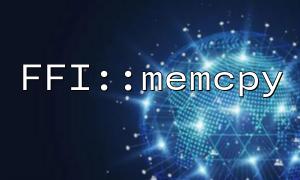As PHP continues to evolve, it is no longer just a scripting language for web development. With the introduction of FFI (Foreign Function Interface), PHP becomes more flexible and can directly interact with C libraries. In scenarios involving large data or requiring efficient memory operations, FFI::memcpy provides a powerful tool to perform high-performance memory block copying in PHP.
FFI (Foreign Function Interface) is a feature introduced in PHP 7.4 that allows PHP programs to directly call C functions. Through FFI, we can bypass PHP’s own memory management system and interact directly with low-level C libraries. This can greatly improve efficiency for tasks requiring high performance, especially in memory operations.
FFI::memcpy is a function provided by the FFI interface that allows you to copy memory blocks from one location to another. Unlike traditional PHP array or string copying methods, memcpy operates at the memory level and is usually faster, especially when dealing with large amounts of data. memcpy is widely used in high-performance applications to optimize memory operations.
Using FFI::memcpy in PHP requires some setup. First, ensure the FFI extension is enabled in your PHP build. Then, create an FFI instance and load the standard C library or any other library you need to call. Here is a basic example demonstrating how to use FFI::memcpy to copy large data blocks:
<span><span><span class="hljs-meta"><?php</span></span><span>
</span><span><span class="hljs-comment">// Load the C standard library</span></span><span>
</span><span><span class="hljs-variable">$ffi</span></span><span> = FFI::</span><span><span class="hljs-title function_ invoke__">cdef</span></span><span>(
</span><span><span class="hljs-string">"void *memcpy(void *dest, const void *src, size_t n);"</span></span><span>,
</span><span><span class="hljs-string">"libc.so.6"</span></span><span> // On Linux usually libc.so.6, on Mac libSystem.dylib
);
<p></span>// Create two arrays to simulate a large data block<br>
$source = FFI::</span>new("char[1024]"); // Create a 1024-byte array<br>
$dest = FFI::</span>new("char[1024]"); // Create another empty array</p>
<p>// Fill source data<br>
for ($i = 0; $i < 1024; $i++) {<br>
$source[$i] = chr($i % </span>256);<br>
}</p>
<p>$ffi->memcpy(FFI::addr($dest), FFI::addr($source), 1024);</p>
<p>for ($i = 0; $i < 1024; $i++) {<br>
echo ord($dest[$i]) . " ";<br>
}<br>
?><br>
</span>Pre-allocate Memory
When copying large data blocks, ensure the destination memory is already allocated. Without a suitable memory block, memcpy incurs memory management overhead, reducing efficiency. Pre-allocating a sufficiently sized memory region can greatly increase copying speed.
Align Data Types
In C, memory alignment affects performance. Ensuring proper alignment of data in memory is key to optimizing memcpy performance. Avoid misaligned data blocks, especially when copying structs or large arrays.
Avoid Unnecessary Memory Copies
If you only need to modify a small portion of data, avoid copying the entire block. While memcpy is efficient, copying a full data block takes time. For minor updates, pointer manipulation or partial updates can prevent unnecessary memory operations.
Use Bulk Copying
For large data blocks, avoid frequent small copies. Splitting data into larger chunks and copying in bulk is more efficient than repeated small-range copies. This is particularly useful when handling large files or streaming data, reducing overhead significantly.
Adopt Appropriate Memory Management Strategies
Although PHP automatically manages memory, you can optimize usage via FFI. For example, FFI::new allows creating custom-sized memory blocks, avoiding extra overhead from PHP’s built-in memory allocator.
Test and Tune Performance
Even though memcpy is efficient, practical performance varies. Test with different data sizes and copy patterns to determine the best approach for your scenario. Use tools like Xdebug or other profiling tools to identify bottlenecks during development.
FFI::memcpy is ideal in the following situations:
Handling Large Files: When reading or writing large amounts of data in PHP, memcpy allows direct memory operations, bypassing PHP’s higher-level abstractions and significantly improving performance.
Efficient Data Transfer: When PHP interacts with C/C++ code, memcpy enables efficient data transfer between different memory regions, particularly for complex data structures.
High-Performance Algorithms: For PHP programs performing intensive numerical computations or data processing, memcpy accelerates memory operations, reducing computation time.
FFI::memcpy is a powerful tool provided by PHP via FFI that can significantly improve the efficiency of copying large data blocks. By pre-allocating memory, avoiding unnecessary copies, and optimizing memory alignment, developers can fully leverage memcpy to enhance performance. Mastering these techniques is essential for tasks involving low-level memory operations, especially when handling large-scale data.


